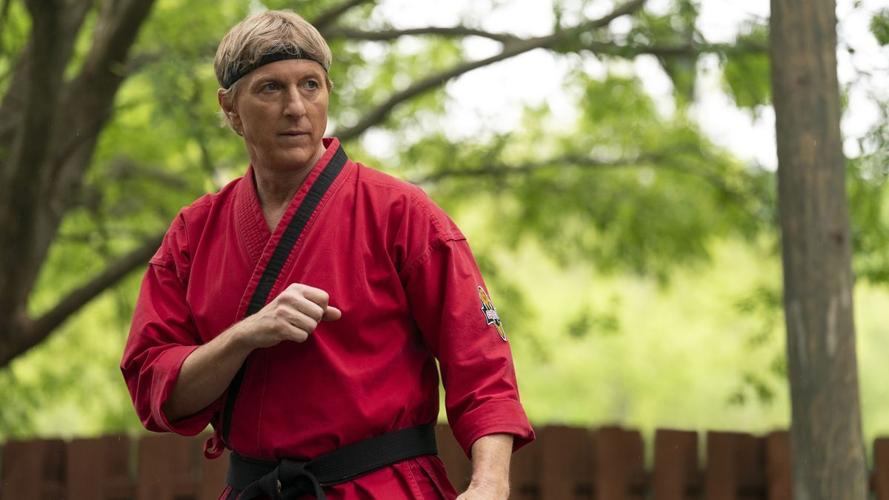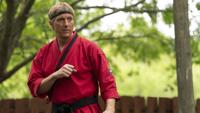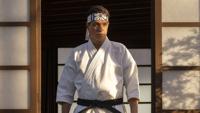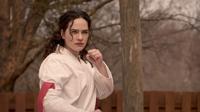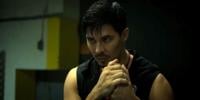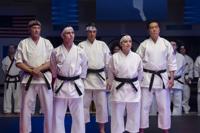This series pulled off an amazing trick when it first premiered on YouTube back in 2018. A series like Stranger Things (2016) had already been the pinnacle of 1980's nostalgia. I'm sure a lot of people thought that it could not get any higher, even though Hollywood continues to traffic in that nostalgia. Star Wars: The Force Awakens (2015) was the year prior and was perhaps the pinnacle of what people call the "legacy sequel," or a piece of film or television that continues the story of something that began decades ago. Many critics had become almost immediately fed up, but we kept getting these legacy sequels. Some of them did rather well financially, but many were dubious over what it was doing to the culture. However, this series, created by Josh Heald, Jon Hurwitz and Hayden Schlossberg, three guys who were mainly known for their work on Harold & Kumar Escape from Guantanamo Bay (2008), this series nailed this idea of 80's nostalgia and legacy sequel in probably the most perfect way possible.
William Zabka is an actor who is best known for his role of Johnny Lawrence, the so-called villain in The Karate Kid (1984). He did various roles over the next 20 years but nothing that ever broke out as big as that 1984 classic. Zabka was nominated for an Oscar at the 76th Academy Awards in 2004 in the category of Best Live Action Short Film. He also had a small role in Hot Tub Time Machine (2010), which was written by Heald. He then had a recurring role on How I Met Your Mother (2005) and, in a 2013 episode, that show had a scene where Zabka's 1984 role as the villain was reinterpreted to make it seem like Johnny Lawrence wasn't the villain at all, but a victim, if not the hero.

Ralph Macchio who is best known for his role of Daniel LaRusso, the so-called hero and titular character in The Karate Kid, was also in that 2013 episode. His character was also reinterpreted to make it seem like Daniel LaRusso wasn't the hero, but instead the bad guy. Most legacy sequels would pick up with Macchio's character and continue with him being that hero. Yet, the clever thing that Heald, Hurwitz and Schlossberg accomplish is that they run with that How I Met Your Mother reinterpretation. We don't continue with Daniel LaRusso and depict him as this great or bullied kid who becomes the protagonist that we come to love. Daniel LaRusso is rather the antagonist here in a lot of ways.
This series is very much the Johnny Lawrence show. Johnny is the hero. He's an unlikely hero. He's a flawed hero. He often says or does inappropriate things and his machismo can be over-the-top or eye-rolling, but what the past five seasons have done is show that if he was considered a villain in that 1984 flick, there was a reason and a cause that is understandable and depicting it has made Johnny a very sympathetic character. This series has also succeeded in making us feel empathy for Johnny in a way that the 1984 film barely touched. That point is no more apparent than in the opening of the finale, which reveals that Johnny has always felt lonely and like a loser. His insecurity was deep-rooted but there.

The series was also about how both Johnny and Daniel are fathers. The past seasons was about how each one chooses to parent, which is a reflection of how both were trained when each were learning their different forms of karate or martial arts. They're manifestations of their two dojos or martial arts schools. Daniel was reared in Miyagi-Do, which is a dojo that is all about inner peace and balance, as well as doing whatever necessary not to fight but if cornered only using defense. Johnny came up in Cobra Kai, a dojo that is all about aggression and offense, or as its members say, "Strike first, strike hard, no mercy!" At the same time, the show is also about masculinity and not just that but humanity in general. In life, each asks if they should lead with offense or operate only in defense.
Of course, the idea of not fighting in a show that has this much fight scenes is pretty ironic. For those who know the original feature, it all culminated in what was called the All Valley Karate Tournament, a fighting competition or sports event that was limited to people who live in southern California. For this final season, they up the stakes and up the stage where all of this culminates. For this final season, everything ends in what's called the Sekai Taikai, a global karate match-up for people who live all over the world. A lot of the previous seasons had violence for violence sake or violence in the streets. This season, the fights are mostly contained to this sporting arena and with definite rules.

The choreography for a lot of the younger fighters is pretty incredible. We really get to see the young cast members show off their moves and skills. Tanner Buchanan (He's All That and Designated Survivor) plays Robby Keane, the son of Johnny, a boy that was basically abandoned by both his parents and who turned to life of petty crime. Seeing a young guy who had a lot of anger and aggression inside of him evolve the way that he did was compelling. Peyton List (School Spirits and Bunk'd) plays Tory Nichols, a female version of Robby, a girl who didn't really have her parents in her life. She was left to fend for herself. Both Robby and Tory get some great fight scenes, as they really embraced the Cobra Kai style of martial arts.
Mary Mouser (Body of Proof and NCIS) plays Samantha LaRusso, the daughter to Daniel. She started out as a bit of a pampered princess. Her father was wealthy and considered a celebrity, so she had a very privileged existence. Her father raised her with a lot of great values, but, as a teenager, she had a rebellious streak. Of the main young characters, chief among them was Xolo Maridueña (Blue Beetle and Parenthood) who plays Miguel Diaz, a kid who was a bit of a nerd and who was bullied in school. To see his growth and the rise of his confidence and strength was the best of all the young actors, my hope is that Maridueña gets more leading roles.

There is a story line involving what these four teenagers will do now that they're graduating from high school and trying to plan their future. There is a nod to the fact that karate or their form of martial arts doesn't really have a future beyond high school. Karate isn't really a professional sport. It was introduced at the 2020 Summer Olympics in Tokyo, but it wasn't a regular event. Confronting the fact that this sport might be one that can't be pursued in a real way after school and hitting the young people with that reality was an important point made here.
While the show does a great job of turning Johnny from a straight villain into a complicated or more sympathetic figure, the show does introduce straight villains to pit against him and the other young characters. Thomas Ian Griffith reprises his role of Terry Silver from The Karate Kid Part III (1989). He's developed a bit more, particularly in regard to his relationship with John Kreese, played by Martin Kove, reprising his role from the first, three films. Both represented to one degree or another the toxic masculinity that corrupted Cobra Kai over 30 years ago. Both men are over the age of 60 with Kove in his 70's, so having them in a climactic fight wasn't really feasible.

Lewis Tan (Mortal Kombat and Wu Assassins) is introduced as the final straight villain in this series. Tan plays Feng Xiao aka Sensei Wolf. He basically picks up the mantle put down by Terry Silver and John Kreese. He leads a dojo named Iron Dragons and his goal is to be a more extreme and even more brutal version of Cobra Kai. Tan is just as great a villain in terms of his ability to taunt his opponents and be very sinister and threatening.
Finally, the 1984 film was nominated for one Oscar at the 57th Academy Awards and that was Best Supporting Actor for the late Pat Morita who played Mr. Miyagi, the sensei for Daniel LaRusso. He was in a lot of ways an Asian stereotype, but this series has done a lot of great work to honor Morita and venerate him in a way that could also be considered stereotypical and problematic. This final season changes this dynamic and suggests that maybe Mr. Miyagi wasn't a wise and perfect person who never did anything wrong. I thought this was a great aspect that gets a bit undermined at the end, but I still stand by the assertion that this is one of, if not the best legacy sequel that's been created.

Rated TV-14-LV.
Running Time: 30 mins. / 15 eps.
Available on Netflix.


